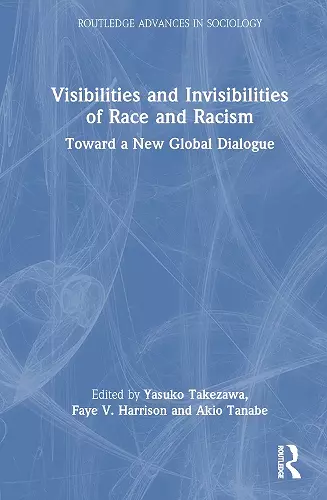Visibilities and Invisibilities of Race and Racism
Toward a New Global Dialogue
Faye V Harrison editor Yasuko Takezawa editor Akio Tanabe editor
Format:Hardback
Publisher:Taylor & Francis Ltd
Published:28th Jan '25
£145.00
Supplier delay - available to order, but may take longer than usual.
This hardback is available in another edition too:
- Paperback£39.99(9781032566863)

Takezawa, Harrison, Tanabe, and their contributors present a multi-sited, transnational, and intercultural perspective on racism, shifting its emphasis away from the conventional North Atlantic interpretive frameworks to better understand its fundamental nature.
Racism is not a uniquely transatlantic phenomenon but, because it is most often understood within Euro-American paradigms, its salience in other contexts is often less visible. The chapters in this volume analyze the process by which fundamentally invisible differences have been made visible, and various groups and communities have been marked, essentialized, and substantialized under a range of social, political, and cultural conditions. Focusing on the space between the visible and invisible, they evaluate the dynamics by which invisible differences are rendered visible, and by which visible differences render other differences invisible. In doing so, they promote a decentering of Western-centered frameworks and elucidate continuities with and discontinuities from past era of racial antagonism and conflict. They look at case studies ranging from Japan, India, and Southeast Asia, to Iceland, the United States, and intra-“white” racism in Europe. The strength of this work lies in its exploration of the varied modalities of race and racism, particularly those that deviate from the conventional, visibly identifiable notions of race, thus broadening the understanding of racism beyond traditional paradigms.
An important contribution to the re-worlding of the study of racism for scholars, researchers, and students of anthropology, sociology, ethnic studies, and intercultural studies.
Takezawa, Harrison, Tanabe’s book radically reshapes our understanding of racism and racialization, decentring the traditional - but somewhat limiting - focus on the Atlantic world formed by European colonialism to encompass contexts from Asia (and from historical periods before the 1400s), in which visible phenotype does not play the same constitutive role. The volume is a groundbreaking addition to the decolonization of European perspectives on race. It is also an important aid to grasping the way that, even in the West, racialization has been increasingly distanced from the classic visible markers of phenotype.
Peter Wade, Professor of Social Anthropology, University of Manchester, UK
By decentralizing and pluralizing voices and gazes, the authors have completely renewed the study of racial discrimination from an anthropological and historical perspective. The result is a very original proposal that goes beyond the color line and the obsession with color blindness, and alerts us to the current strength of racial prejudice on a global scale.
Jean-Frédéric Schaub, Professor, École des hautes études en sciences sociales, France
So much of the framing, scholarship and social and cultural history on race and racism up to and through the 20th century has been shaped as a transatlantic project. That is a dominant focus that the editors of this book have called a Euro-American paradigm. What this western framing overlooks is that a globalized world historically and in the 21st Century, has been experiencing the processes of racing and othering in different ways, outside of this western paradigm. What if a group of scholars were to decenter these western notions of what race is and is not and look at these processes from a global standpoint? Visibilities and Invisibilities of Race and Racism is just that book. Using the overarching themes of visibility and invisibility, and using case studies from Japan, India, Southeast Asia, the United States, Iceland and Europe this book offers us a more comprehensive set of paradigms to help us better understand the fundamental nature of the processes and mechanisms of race making. It also provides an opportunity for global dialogue about race and racism that privileges the knowledge and experiences of people in other parts of the world. This is an extremely important and timely book for scholars, students, the lay public and policy makers to better understand and engage with the globally diverse forms of racialization both observed and hidden in a larger conversation.
Yolanda T. Moses, Professor of Anthropology, University of California Riverside, USA
Former President of the American Anthropology Association and National Chair of the “Race are we Different” Project
ISBN: 9781032566849
Dimensions: unknown
Weight: 453g
246 pages